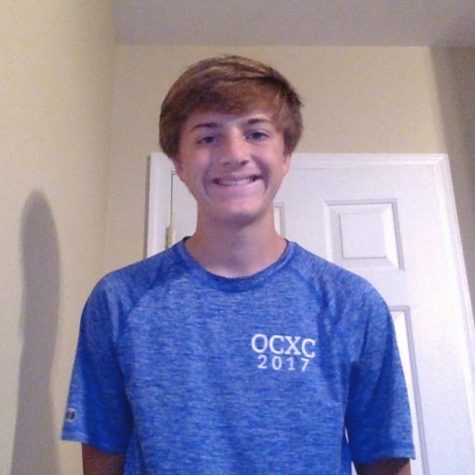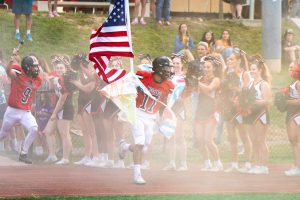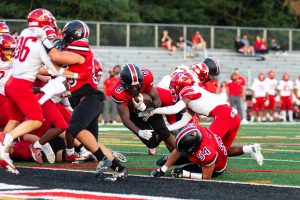The name change decision should have fallen on the city
December 16, 2020

I believe in justice. I believe in equality. I believe that all Americans should be treated equally under the law. I believe that we are moving in the right direction toward justice. I also believe changing the names of the schools by a school board vote is not the way to do this.
By changing the names of George Mason High School and Thomas Jefferson Elementary school, it is setting a precedent for the rest of Virginia, and possibly the nation to see. This is a dangerous precedent being set by the school board, and one that should be more directly decided in the public, not on the shoulders of a seven member school board. This issue is less about schools and more about cultural change.
When a survey was sent out to the people of Falls Church about the idea of a name change, the results came back conclusive. Overall, 56% of participants wanted to keep the name of George Mason the way it is, with 26% against, then 19% with no opinion. Thomas Jefferson had a number of 56% for, 23% against, and 22% with no opinion.
It was also predicted that the changing of school names would cost more than $100,000 for both of the schools, a massive cost in a little city. During this pandemic, the School Board has had to make numerous budget cuts because of shortfalls in income as a result of the pandemic, which could be a better source of spending than the renaming of the schools. Our budget is tight this year. The district is also finishing up an 108 million dollar new school.
I believe that keeping the names the way they are is not racist. I think believing that Thomas Jefferson and George Mason should be remembered for the good things they did to help shape the country we live in today is not racist. Keeping the names is about remembering people for the positive things they have done in contributing to the foundation of not only Virginia but also the country as a whole.
I believe that we cannot set a precedent through the changing of the school names without a more formal decision making process that involves the public more. As a city, we have not embraced the ramifications of the name change, and I believe that if we choose to change the name of George Mason and Thomas Jefferson it has to be done through the public, as it is less of an issue of schools but one of shifting culture instead.
This is one of a series of student-written opinions about the potential name change of George Mason High School and Thomas Jefferson Elementary. Read more here.
Opinion articles in The Lasso reflect the opinion of the writer(s). They do not necessarily reflect the opinion of the Lasso Editorial Board or of George Mason High School.









Thomas Beal • Dec 17, 2020 at 2:17 PM
A very fine article, Mr. Wildman. As you have written, “Keeping the names is about remembering people for the positive things they have done in contributing to the foundation of not only Virginia but also the country as a whole.” The majority seems to agree and has spoken. But unfortunately the result has been undermined. Why?
A good guess might be that the underminers are undereducated and on a bandwagon. Maybe they don’t know or understand our nation’s history. Or maybe they adhere to something real historians refer to as a “fragmentary” approach to history. They seek to go about name-changing because they see the past as mainly morally objectionable. And this fragmentary, moralistic approach has been used to do such things as rewrite history into false, incomplete narratives, often in fragments that leave out important facts, details, figures, and contexts. This was the case of the infamous 1619 Project.
The fragmentists in Falls Church and elsewhere don’t seem to be able to grasp what the fine Cana Academy historian Andrew Zwerneman has described in his “History Forgotten and Remembered” as the important roles of both slavery AND freedom in the birth of our nation; their brutal collision leading to the civil war, our long struggle for justice and integration, and our ongoing search and journey toward what Zwerneman calls the “equality of freedom.”
As Mr. Wildman suggests, George Mason was much more a man of many goods than a slave holder.
The great historian Gordon Wood has written that when looking at history like our fragmentists, you unfortunately merely “condemn the past for not being more like the present.”
Thomas Beal • Dec 17, 2020 at 11:38 AM
Thank you for your fine piece, Mr. Wildman. Thank you foremost for refusing to condemn the past for not being more like the present.
The changing of school names is indeed a “dangerous precedent,” and a good example of how the study of our history, the good and the bad, is increasingly under siege. It is a woeful sign of our divided culture and a symptom of the decline of our education system. Changing the names of our schools is anti-education and anti-historical, and a very good example of what numerous American academics and educators call “fragmentary history.” Such a view foolishly obscures and negates the formative roles of slavery and freedom in our nation’s history. This “liberal approach” includes what historian Andrew Zwerneman says is not only the “founding” but also “the devolution to civil war, the century-long struggle for integration, and the nation’s ongoing quest for equality and freedom.” The “fragmentary” approach, in contrast, views the past as not merely morally objectionable but as an opportunity to impose a twisted approach to history similar to that of the 1619 Project.
The changing of school names in Falls Church really has little to do with history and more to do with the fragmented views of people in positions of power. The survey’s results suggest people of Falls Church, in general, thank goodness, in their wisdom, refuse to condemn the past for not being more like the present.
Mohammad • Dec 17, 2020 at 9:51 AM
An excellent article that speaks for the majority of Falls Church residents.